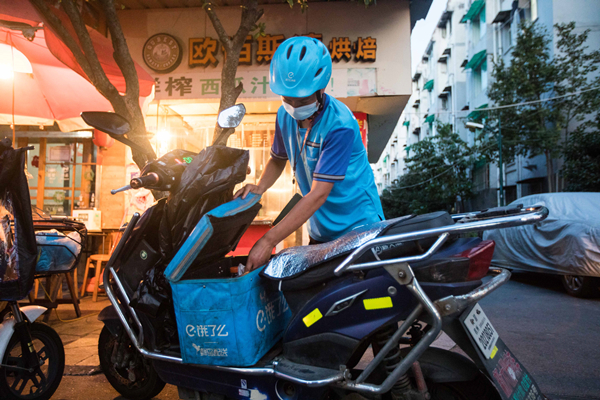Rests mandated for food couriers, ride-hailing drivers

A food deliveryman delivers food in the street of Hangzhou, capital of East China's Zhejiang province. [Photo/IC]
Drivers for ride-hailing platforms in Zhejiang province and couriers for online food delivery services are entitled to compulsory rests each day, according to a regulation released by eight provincial government departments on Wednesday.
Those who work continuously for over four hours will be provided with a break of no less than 20 minutes to ensure they have enough rest time.
The regulation also required online platform companies to extend minimum delivery time slots and ease the workloads of couriers and drivers during extreme weather such as typhoons or rainstorms.
It was drafted with the aim of reminding couriers and drivers to pay more attention to the balance between work and rest, and to get proper rest to ensure their sound health and the quality of services. Companies were told to increase the pay of those working on holidays.
"This regulation clearly stipulates that the labor remuneration paid by these enterprises to workers who provide normal labor shall not be lower than the local minimum wage standard," Li Xiaojing, an attorney at Zhejiang Suhao Law Firm, told Ningbo Evening News on Thursday. "This solves a problem that has existed for a long time as some rights of couriers with online platform companies were not well cared for in the past."
In recent years, there has been an increase in the number of disputes related to food couriers who have been involved in traffic accidents, demonstrating the intense work pressures they face, along with online ride-hailing drivers.
The State Council, China's Cabinet, released a plan recently to promote employment during the 14th Five-Year Plan (2021-25) period, stressing the need to regulate the development of flexible employment by getting rid of impediments and protecting the rights of workers including food couriers and ride-hailing drivers.
There are 7.7 million food couriers engaged in flexible work in China, with many struggling due to the platforms' pursuit of higher profits amid fierce market competition.
Fang Xiaoying in Hangzhou contributed to this story.


 Shaoxing Showdowns
Shaoxing Showdowns Zhejiang: A Decade of Progress
Zhejiang: A Decade of Progress Shaoxing in expats' eyes
Shaoxing in expats' eyes